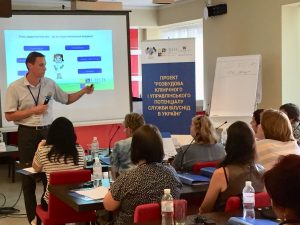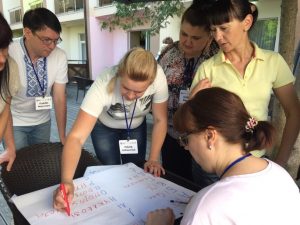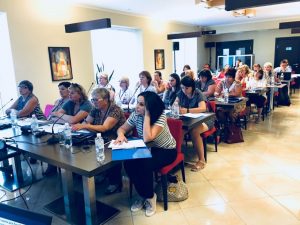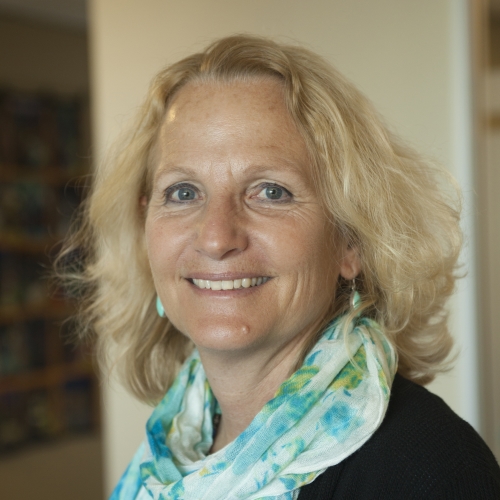I-TECH seconded staff work in collaboration with government officers and program managers, and bring technical expertise to efforts to strengthen health systems. Continue reading “Technical Support to the National HIV Response in Malawi”
Category: Clinical Mentoring
I-TECH Ukraine Conducts In-Service Nurse Training Pilots for Achieving 90-90-90
Recent public health care reform in Ukraine has called for the growing role of primary health care, task shifting, and decentralization of HIV services while providing care and treatment for people living with HIV (PLWH). In June 2018, the International Training and Education Center for health (I-TECH) Ukraine conducted two back-to-back, five-day in-service training programs on HIV testing services for two cohorts of participants from twelve regions across Ukraine.

The concept and design of these unique pilot training programs were influenced by the recent reform to actively involve general practice/primary care nurses into the process of achieving UNAIDS 90-90-90 targets in Ukraine.
A group of 10 national HIV and health care reform experts, I-TECH’s international consultant-nurse practitioner, and the I-TECH Ukraine training development team carefully designed the learning objectives and content of the training program with consideration of the specifics of the national HIV epidemic, participant backgrounds, as well as anticipated task shifting. Together, these experts synthesized and presented international and national clinical and nursing best practices in the area of serving PLWH.
Training participants included nurses from primary care facilities, specialized HIV clinics, as well as faculty of seven local nursing colleges, including I-TECH Ukraine’s national partners – Ternopil State Medical University and the Nursing College of Poltava Ukrainian Medical and Dental Academy.
The training programs outlined roles for general practice/primary care nurses in achieving UNAIDS 90-90-90 targets, taught HIV basics, helped develop skills for HIV testing services with rapid HIV test kits, and coached participants on conducting counseling for PLWH using a non-discriminatory, patient-centered approach.

Facilitators used interactive training tools and approaches during the program to fully engage participants and strengthen the capacity of the nursing college’s faculty to teach up-to-date HIV content in an appealing and efficient way.
One of the central elements of the program was to educate the participating nurses about the challenges surrounding HIV-related stigma and discrimination with a major goal to overcome it in the nursing community and encourage respectful delivery of services for PLWH.
“[I-TECH Ukraine and its partners are] doing such a[n] important thing,” says Valentyna Borysova, lecturer of Zaporizhzhia Nursing College. “Educating nurses on HIV has been so much underestimated and under-invested in Ukraine.”
In addition to feeling as though this training addressed a critical gap in education, participants also provided positive feedback about the content and facilitation of the training, especially the parts of the training that were facilitated by the international and national peer nurses.

“The knowledge on testing and post-exposure prophylaxis are badly needed at our clinic,” says Liudmyla Samolelis, Senior Nurse of the Psychiatric Clinic in Poltava, Head of Poltava Oblast Nurse Association. “I plan to conduct an on-the-job training for the nurses, using the materials from the training.”
Due to the success of the pilot trainings, I-TECH Ukraine intends to finalize training materials, institutionalize the course through its local partners, and develop a manual that could be used in different training formats, including state-owned colleges and medical universities. In addition, an ambitious regional rollout of the training program is anticipated during the next year of the project.
I-TECH Haiti Country Office Becomes an Independent NGO
On June 1, 2018, the University of Washington’s International Training and Education Center for Health (I-TECH) country office in Haiti officially became a local non-governmental organization (NGO). The office will be rebranded as the Centre Haïtien pour le Renforcement du Système de Santé (CHARESS) and will continue to implement programs to improve HIV services via a trained health workforce, robust health information systems (HIS), and clinical mentoring.
CHARESS will be responsible for maintaining, training, and deploying HIS such as iSantéPlus and the Système d’Echange d’Information de Santé d’Haïti (SEDISH), a national health information exchange, across Haiti and ensure the sites receive on-site and remote technical assistance. The team will also oversee clinical mentoring activities at 20 sites and provide technical assistance to the Ministry of Public Health and Population (MSPP) and other implementing partners in Haiti.
“I-TECH has a mission to support sustainable development,” says Scott Barnhart, MD, MPH, Professor in the Department of Global Health and an I-TECH Principal Investigator overseeing programs in Haiti. “The conversion of the I-TECH country office and launch of a fully independent NGO to take up those activities is testament to I-TECH’s commitment to fostering locally owned and led development.”
The announcement of the shift to local ownership comes after two years of strategic planning by key stakeholders and partners to successfully transition I-TECH Haiti’s country office into an independently functioning NGO. As such, CHARESS will aim to allocate more of its funding to program activities, as well as pursue local funding opportunities restricted to Haitian organizations.
“The programs that are shifting to CHARESS have already proved to have had a dramatic impact on the health care landscape in Haiti,” remarked Jean-Guy Honoré, MD, I-TECH Haiti’s Country Director. “Transitioning of the key programs, specifically our HIS work, to a local ownership will allow CHARESS to become a leader in sustainability on the global stage. We are proud of the work that we have accomplished and look forward to the future.”
For 16 years, I-TECH has helped develop strong national health systems in low- to middle-resource countries while promoting the importance of local ownership as a way to sustain those effective health systems. I-TECH will continue to be a close partner in supporting CHARESS and looks forward to continued collaboration.
Improving HIV Care and Treatment across the Caribbean
I-TECH supports a variety of activities aimed at improving HIV care and treatment in the Caribbean region, such as on-site clinical mentoring, development of training curricula, and providing clinical support materials to improve care and treatment for HIV/AIDS in the Caribbean region.
Continue reading “Improving HIV Care and Treatment across the Caribbean”
Continuous Quality Improvement Collaborative in the Caribbean
Since 2013, I-TECH has led quality improvement (QI) collaboratives in the Caribbean region, enabling multidisciplinary teams at health facilities to work toward a common goal of improving care and treatment for HIV-positive patients.
Continue reading “Continuous Quality Improvement Collaborative in the Caribbean”
Gabrielle O’Malley

Gabrielle O’Malley, MA, PHD, is I-TECH’S Director of Implementation Science. Dr. O’Malley has worked as an applied research and evaluation professional for over 25 years. Her experience includes a wide variety of international and domestic programs including child survival, private agricultural enterprise, medical education, community technology, reproductive health, HIV prevention (PrEP), and care and treatment as well as applied research for private industry. Her research interests include innovative practices for program evaluation and improvement, formative research, qualitative methods, and the relationship of gender and health.
Dr. O’Malley received her PhD from UW, an MA from Johns Hopkins University and a BA from Smith College.
Program Highlights
Human Resources for Health in Mozambique
I-TECH’s long engagement with clinician education in Mozambique includes support for improvements to the national undergraduate (“pre-service”) curriculum for laboratory technicians (Técnicos Medio de Laboratório) to make the content more current and reflect the health care priorities of the country, including advances in HIV diagnostics and treatment monitoring. The curriculum is now standardized so that students at all health training institutes (HTIs) are taught using the same material and methods. Continue reading “Human Resources for Health in Mozambique”
Case Finding and Retention in Care in Mozambique
I-TECH works with the Mozambique Ministry of Health (MISAU) to expand a pilot project to provide an assisted partner services intervention. The project is aimed at encouraging patients newly diagnosed with HIV infection to disclose their status to their partners, and bring them to the clinic for testing. Continue reading “Case Finding and Retention in Care in Mozambique”
Quality Improvement (QI) of HIV Care and Treatment, and Expanded Clinical Mentoring in Mozambique
I-TECH provides assistance to MISAU in implementation of the national Quality Improvement for HIV Services (QIHS) Strategy, with the goal of improving HIV clinical care through the training of clinicians in QI cycles (Plan-Do-Study-Act) and mentoring to improve weak performance indicators. To expand the impact of its programming, ART Committees and distance learning have been used to reach health workers in more rural settings.
Training through Distance Learning in Namibia using the Project ECHO Model
I-TECH in Namibia spearheaded use of distance learning for HIV care and treatment through the establishment of a digital video conferencing network to link Windhoek with training sites and hospitals throughout the country starting in 2008. Building off that foundation, Namibia became the first country in Africa to implement the Project ECHO model, a tele-health platform started at the University of New Mexico, whereby clinicians in remote areas connect with rotating subject matter experts and clinicians a robust virtual community of practice to build health care worker capacity, support peer-to-peer cross-facility learning and reduce feelings of professional isolation.
Continue reading “Training through Distance Learning in Namibia using the Project ECHO Model”